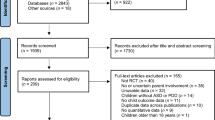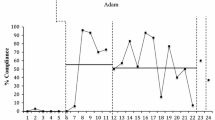Abstract
This paper examines the reliability and validity of parent target problems (PTPs) in a multi-site randomized controlled trial of parent training (PT) versus psychoeducation (PEP) in children (150 boys, 19 girls; mean age 4.7 ± 1.2 years) with autism spectrum disorder (ASD) and disruptive behavior. At baseline, treatment blind, independent evaluators asked parents to nominate the child’s top two problems. Each problem was documented in a brief narrative. Narratives were reviewed and revised at follow-up visits during the six-month trial. When the trial was completed, five judges, blind to treatment condition, independently rated change from baseline on a 9-point scale (1 = normal; 2 = markedly improved; 3 = definitely improved; 4 = equivocally improved; 5 = no change; 6 = possibly worse; 7 = definitely worse; 8 = markedly worse; 9 = disastrously worse) at Weeks 8, 12, 16, and 24 (inter-rater intraclass correlation = 0.78). PTP scores for the two target problems were averaged across the five raters, yielding a mean score for each child at each time point. Mean PTP scores showed improvement in both treatment groups over the 24-week study. Compared to PEP, PTP ratings showed a steeper decline in PT based on significant interaction of group and time (t(df) = 2.14(155.9), p = 0.034; Week 24 effect size = 0.75). In categorical analysis, we compared cutoffs mean PTP scores of 3.0 (definitely improved), 3.25, and 3.5 with the positive response rate on the Clinical Global Impressions-Improvement scale from the original study. Sensitivities ranged from 52–78%. PTP narratives offer a systematic, reliable, and valid way to track child-specific outcomes in clinical trials and clinical practice.

Similar content being viewed by others
Data Availability
Associated data from this study is included in the National Database for Autism Research.
Code Availability
The data for this project are confidential.
References
Aman, M. G., McDougle, C. J., Scahill, L., Handen, B., Arnold, L. E., Johnson, C., Stigler, K. A., Bearss, K., Butter, E., Swiezy, N. B., Sukhodolsky, D. D., Ramadan, Y., Pozdol, S. L., Nikolov, R., Lecavalier, L., Kohn, A. E., Koenig, K., Hollway, J. A., Korzekwa, P., Gavaletz, A., … Research Units on Pediatric Psychopharmacology Autism Network. (2009). Medication and parent training in children with pervasive developmental disorders and serious behavior problems: Results from a randomized clinical trial. Journal of the American Academy of Child and Adolescent Psychiatry, 48(12), 1143–1154. https://doi.org/10.1097/CHI.0b013e3181bfd669
American Psychiatric Association. (2013). Diagnostic and Statistical Manual of Mental Disorders (5th ed.). American Psychiatric Press.
Arnold, L. E., Vitiello, B., McDougle, C., Scahill, L., Shah, B., Gonzalez, N. M., Chuang, S., Davies, M., Hollway, J., Aman, M. G., Cronin, P., Koenig, K., Kohn, A. E., McMahon, D. J., & Tierney, E. (2003). Parent-defined target symptoms respond to risperidone in RUPP autism study: Customer approach to clinical trials. Journal of the American Academy of Child and Adolescent Psychiatry, 42(12), 1443–1450. https://doi.org/10.1097/00004583-200312000-00011
Bearss, K., Johnson, C., Smith, T., Lecavalier, L., Swiezy, N., Aman, M., McAdam, D. B., Butter, E., Stillitano, C., Minshawi, N., Sukhodolsky, D. G., Mruzek, D. W., Turner, K., Neal, T., Hallett, V., Mulick, J. A., Green, B., Handen, B., Deng, Y., … Scahill, L. (2015). Effect of parent training vs parent education on behavioral problems in children with autism spectrum disorder: A randomized clinical trial. JAMA, 313(15), 1524–1533. https://doi.org/10.1001/jama.2015.3150
Bearss, K., Taylor, C. A., Aman, M. G., Whittemore, R., Lecavalier, L., Miller, J., Pritchett, J., Green, B., & Scahill, L. (2016). Using qualitative methods to guide scale development for anxiety in youth with autism spectrum disorder. Autism, 20(6), 663–672. https://doi.org/10.1177/1362361315601012
Food and Drug Administration. Guidance for industry: Patient-reported outcome measures: use in medical product development to support labeling claims. 2009. Available at: Patient-Reported Outcome Measures: Use in Medical Product Development to Support Labeling Claims. Accessed November 7, 2020.
Forrest, C. B., Bevans, K. B., Tucker, C., Riley, A. W., Ravens-Sieberer, U., Gardner, W., & Pajer, K. (2012). Commentary: The patient-reported outcome measurement information system (PROMIS®) for children and youth: Application to pediatric psychology. Journal of Pediatric Psychology, 37(6), 614–621. https://doi.org/10.1093/jpepsy/jss038
Garland, A. F., Kruse, M., & Aarons, G. A. (2003). Clinicians and outcome measurement: What’s the use? The Journal of Behavioral Health Services & Research, 30(4), 393–405. https://doi.org/10.1007/BF02287427
Guy, W. (1976). ECDEU Assessment Manual for Psychopharmacology: US Department of Health, Education, and Welfare. Washington, DC.
Iadarola, S., Levato, L., Harrison, B., Smith, T., Lecavalier, L., Johnson, C., Swiezy, N., Bearss, K., & Scahill, L. (2018). Teaching Parents Behavioral Strategies for Autism Spectrum Disorder (ASD): Effects on Stress, Strain, and Competence. Journal of Autism and Developmental Disorders, 48(4), 1031–1040. https://doi.org/10.1007/s10803-017-3339-2
Kaat, A. J., Lecavalier, L., & Aman, M. G. (2014). Validity of the aberrant behavior checklist in children with autism spectrum disorder. Journal of Autism and Developmental Disorders, 44(5), 1103–1116. https://doi.org/10.1007/s10803-013-1970-0
Lecavalier, L., Smith, T., Johnson, C., Bearss, K., Swiezy, N., Aman, M. G., Sukhodolsky, D. G., Deng, Y., Dziura, J., & Scahill, L. (2017). Moderators of Parent Training for Disruptive Behaviors in Young Children with Autism Spectrum Disorder. Journal of Abnormal Child Psychology, 45(6), 1235–1245. https://doi.org/10.1007/s10802-016-0233-x
Lord, C., Rutter, M., DiLavore, P.C., & Risi, S. (1999). Autism Diagnostic Observation Schedule, Second Edition (ADOS-2) Modules 1–4. Los Angeles, CA: Western Psychological Services.
McGuire, J. F., Sukhodolsky, D. G., Bearss, K., Grantz, H., Pachler, M., Lombroso, P. J., & Scahill, L. (2014). Individualized assessments in treatment research: An examination of parent-nominated target problems in the treatment of disruptive behaviors in youth with Tourette syndrome. Child Psychiatry and Human Development, 45(6), 686–694. https://doi.org/10.1007/s10578-014-0437-7
Mullen, E. M. (1995). Mullen Scales of Early Learning. American Guidance Service.
Postorino, V., Sharp, W. G., McCracken, C. E., Bearss, K., Burrell, T. L., Evans, A. N., & Scahill, L. (2017). A systematic review and meta-analysis of parent training for disruptive behavior in children with autism spectrum disorder. Clinical Child and Family Psychology Review, 20(4), 391–402. https://link.springer.com/article/10.1007%2Fs10567-017-0237-2
Research Units on Pedaitric Psychopharmacology (RUPP)Autism Network (2002) Risperidone in children with autism and serious behavioral problems, New England Journal of Medicine, 347(5), 314-321
Roid, G. H. (2003). Stanford-Binet Intelligence Scales (5th ed.). Riverside.
Rutter, M., LeCouteur, A., & Lord, C. (2003). ADI-R: Autism Diagnostic Interview—Revised (ADI-R). Los Angeles, CA: Western Psychological Services.
Scahill, L., Bearss, K., Lecavalier, L., Smith, T., Swiezy, N., Aman, M.G., Sukhodolsky, D.G., McCracken, C., Minshawi, N., Turner, K., Levato, L., Saulnier,C., Dziura, J., Johnson, C. (2016). Effect of Parent Training on Adaptive Behavior in Children with Autism Spectrum Disorder and Disruptive Behavior: Results of a randomized trial. Journal of the American Academy of Child and Adolescent Psychiatry, 55(7):602–609.
Scahill, L., Bearss, K., Sarhangian, R., McDougle, C. J., Arnold, L. E., Aman, M. G., McCracken, J. T., Tierney, E., Gillespie, S., Postorino, V., & Vitiello, B. (2017). Using a Patient-Centered Outcome Measure to Test Methylphenidate Versus Placebo in Children with Autism Spectrum Disorder. Journal of Child and Adolescent Psychopharmacology, 27(2), 125–131. https://doi.org/10.1089/cap.2016.0107
Sparrow, S., Cicchetti, D., & Balla, D. (2005). Vineland Adaptive Behavior Scales (2nd ed.). Pearson Assessments.
Stahmer, A. C., Dababnah, S., & Rieth, S. R. (2019). Considerations in implementing evidence-based early autism spectrum disorder interventions in community settings. Pediatric Medicine, 2, 18. https://doi.org/10.21037/pm.2019.05.01
Tillmann, J., Cáceres, S. J., & A., Chatham, C. H., Crawley, D., Holt, R., Oakley, B., Banaschewski, T., Baron-Cohen, S., Bölte, S., Buitelaar, J. K., Durston, S., Ham, L., Loth, E., Simonoff, E., Spooren, W., Murphy, D. G., Charman, T., & EU-AIMS LEAP group. (2019). Investigating the factors underlying adaptive functioning in autism in the EU-AIMS Longitudinal European Autism Project. Autism Research, 12(4), 645–657. https://doi.org/10.1002/aur.2081.
Verstraete, J., Ramma, L., & Jelsma, J. (2020). Item generation for a proxy health related quality of life measure in very young children. Health and Quality of Life Outcomes, 18(1), 11. https://doi.org/10.1186/s12955-020-1271-1
Warnick, E. M., Bearss, K., Weersing, V. R., Scahill, L., & Woolston, J. (2014). Shifting the treatment model: Impact on engagement in outpatient therapy. Administration and Policy in Mental Health, 41(1), 93–103. https://doi.org/10.1007/s10488-012-0439-3
Weisz, J. R., Chorpita, B. F., Frye, A., Ng, M. Y., Lau, N., Bearman, S. K., Ugueto, A. M., Langer, D. A., Hoagwood, K. E., & Research Network on Youth Mental Health. (2011). Youth Top Problems: Using idiographic, consumer-guided assessment to identify treatment needs and to track change during psychotherapy. Journal of Consulting and Clinical Psychology, 79(3), 369–380. https://doi.org/10.1037/a0023307
Author information
Authors and Affiliations
Corresponding author
Ethics declarations
Funding
This work was supported by a grant from the National Institute of Mental Health (NIMH; R01 MH081148; principal investigator: Dr. Scahill) and funding from the Atlanta Children’s Trust, the Marcus Foundation, and the Whitehead Foundation.
Conflicts of Interest
Dr. Johnson reported having received book royalties from Oxford University Press and the American Psychological Association. Dr. Lecavalier reported having received book royalties from Oxford University Press. Dr. Turner reported having received book royalties from Cognella Publishing. Dr. Bearss reported having served as a consultant to Attend Behavior and Genial Care and having received book royalties from Oxford University Press. Dr. Scahill reported having served as a consultant to Roche, Janssen, Impel, and Yamo, and book royalties from Oxford University Press, Guilford Press, and the American Psychological Association. No other conflicts of interests or disclosures were reported.
Ethics Approval
All procedures performed in studies involving human participants were in accordance with the ethical standards of the institutional and/or national research committee and with the 1964 Helsinki declaration and its later amendments or comparable ethical standards.
Inform Consent
Informed consent was obtained from all individual participants included in this study.
Additional information
Publisher’s Note
Springer Nature remains neutral with regard to jurisdictional claims in published maps and institutional affiliations.
Rights and permissions
About this article
Cite this article
Sheridan, E., Gillespie, S., Johnson, C.R. et al. Using Parent Target Problem Narratives to Evaluate Outcomes in Children with Autism Spectrum Disorder. Res Child Adolesc Psychopathol 49, 1527–1535 (2021). https://doi.org/10.1007/s10802-021-00843-8
Accepted:
Published:
Issue Date:
DOI: https://doi.org/10.1007/s10802-021-00843-8




